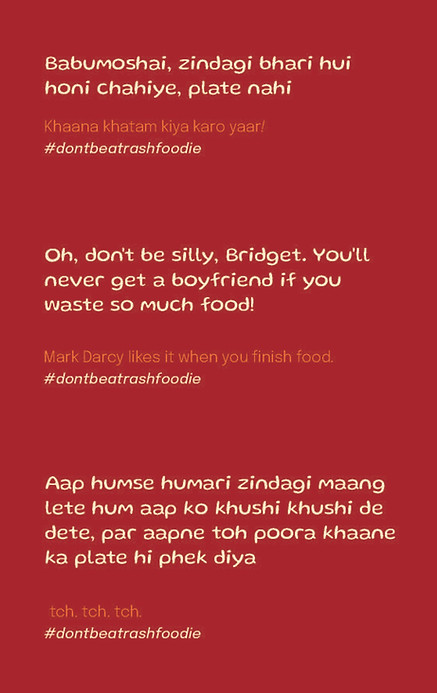top of page

DESIGN PROCESS
PRIMARY RESEARCH
OVERVIEW
By addressing food wastage as a part of *UNSDG 12, we can minimize the environmental impact, alleviate hunger, and promote sustainable consumption and production patterns. At a college level this project aims to urge students to think about their everyday actions with respect to food and drive them to change.

Questions were put out through google forms to gather a perspective of students in campus about food in general and it’s wastage. The answers in the Google form were biased and hence the questionnaire had to be taken down.






Questions were sent on the same Whatsapp group over a course of 4 days and results were calculated 24 hours after the question was posted. Whataspp polls guaranteed a larger reach and I gathered data that I could work with.




This research verified that one action or initiative is not enough to bring about a change in something that is deeply ingrained in people’s minds, people’s relationship with food. It fueled the fact that my solution needs to focus on intercepting an age old mentality and make people look at food or food wastage differently. It’s behavioral psychology.
I decided it would be best if I set up an interactive campaign in the university campus itself. A campaign that doesn’t tell the audience the typical ‘don’t waste food’ or guarantees 'zero waste’.
*UNSDG 12- The goal aims to promote the efficient use of resources, minimize waste generation, and promote sustainable lifestyles and practices.
Click to jump sections

IDEATION
set up -installation?
-kiosk?
no digital platform, all outcomes physical
be relatable with copies- pop culture/ movies
people interact on their own, clear instructions provided
use Hindi and English both
journey of food from
plate to dustbin
tackling food waste, a moral obligation too
upcycling food, collab with organisation- local school?
hunger and food waste- two sides of the same coin
something interactive, no person involved at site


MOODBOARD
light hearted theme, heavy topic
abstract food visuals, no direct visuals
use of rhetorics, idioms, puns
warm tones only

COLOR PALETTE
TYPOGRAPHY
-has variables, curvy, readable, good for body text
-has variables, handwritten, organic, headings

DELIVERABLES & EXECUTION
Posters
Chits for interactive experience



These chits were placed near the food disposal area at the eateries in campus. After keeping used plate, customers were expected to pick up chits according to the amount of food left in their plate.
Empty plate
Less than half food left
More than half food left
This would lead to self reflection of how much food they are wasting, further enhanced by relatable copies.
Danglers



The phrase 'Learn to Say No" captures attention immediately. These danglers were strategically placed at eateries where they serve sambar, chutney and ketchup . This urges customers to ask the staff to not serve a certain item if they are not going to eat it as the staff prepares the plate in front of them.
Next Project
bottom of page























